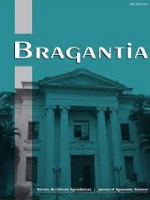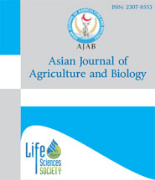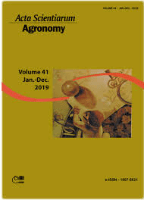
BRAGANTIA
Scope & Guideline
Empowering Innovation in Agriculture and Biology
Introduction
Aims and Scopes
- Sustainable Agriculture Practices:
Research that explores innovative and sustainable methods in agriculture, including the use of organic amendments, biochar, and integrated pest management strategies. - Crop Physiology and Genetics:
Studies on the physiological responses of various crops to environmental stresses, genetic evaluations, and breeding techniques aimed at improving crop resilience and yield. - Soil Management and Fertility:
Investigations into soil chemistry, microbiology, and the impact of different fertilization regimes on soil health and crop productivity. - Horticultural Science and Crop Improvement:
Research focusing on the cultivation techniques, pest resistance, and quality improvement of horticultural crops, including fruits and vegetables. - Environmental Impact Studies:
Analysis of agricultural practices on ecosystems, including studies on soil erosion, water management, and the effects of climate change on crop production. - Biotechnology in Agriculture:
Exploration of biotechnological advancements in crop breeding, including genetic modifications and the application of plant growth-promoting microorganisms.
Trending and Emerging
- Climate Resilience and Adaptation Strategies:
There is a growing emphasis on research that examines how crops can be managed to withstand climate variability, including drought and flooding. - Use of Biopesticides and Biological Control Agents:
An upward trend in studies exploring the efficacy of biopesticides and natural enemies of pests indicates a shift towards eco-friendly pest management practices. - Advanced Genetic Techniques:
Emerging themes include the use of CRISPR and other genetic editing technologies to enhance crop traits, signaling a significant advancement in agricultural biotechnology. - Circular Economy in Agriculture:
Research focusing on sustainability practices that incorporate waste recycling and resource efficiency is on the rise, highlighting a shift towards a circular agricultural economy. - Precision Agriculture Technologies:
Increasing publications on the application of precision agriculture tools, such as remote sensing and data analytics, to optimize crop management and resource use.
Declining or Waning
- Traditional Pest Control Methods:
Research focusing on conventional chemical pesticides is decreasing as emphasis shifts towards integrated pest management and organic alternatives. - Basic Agronomy Without Contextual Applications:
Studies that solely present agronomic data without practical applications or implications for sustainable practices are becoming less frequent. - Studies on Single Crop Systems:
There is a noticeable decline in research focused exclusively on single crop systems, with a shift towards multi-crop and intercropping systems that promote biodiversity. - Soil Chemistry Studies in Isolation:
Research focusing solely on soil chemistry without considering biological or physical interactions is waning, as a more holistic view of soil health gains traction. - Static Crop Management Techniques:
Research on static crop management practices that do not adapt to changing climate conditions or technological advancements is becoming less relevant.
Similar Journals

Revista Caatinga
Unlocking Insights for Global Agricultural ChallengesRevista Caatinga is a premier open-access journal published by Universidade Federal Rural do Semi-Árido (UFERSA), dedicated to the dissemination of significant research within the field of Agricultural and Biological Sciences. Since its inception in 2006, the journal has aimed to bridge the knowledge gap in various aspects of agricultural practices and biological phenomena, making vital contributions to the scientific community. With its publications indexed in Scopus and holding an impressive Q2 categorization in the competitive landscape of agricultural sciences, the journal ranks within the top half of its category (100/221), demonstrating a commitment to quality scholarship. The journal is based in Brazil and covers a wide array of topics relevant to both local and global agricultural challenges. By fostering open access, Revista Caatinga ensures that vital research is available to a broad audience, promoting knowledge sharing and collaboration among researchers, practitioners, and students around the world.

Revista de Agricultura Neotropical
Nurturing Sustainable Solutions for Tropical AgricultureRevista de Agricultura Neotropical, published by UNIV ESTADUAL MATO GROSSO SUL, serves as a pivotal platform for disseminating research in the fields of agronomy and crop science. Since its inception as an open-access journal in 2014, it has been dedicated to promoting innovative research and practical applications within the agricultural sector, specifically tailored to the challenges and dynamics of the tropical agriculture landscape in Brazil and beyond. Although currently positioned in the Q4 quartile of Scopus rankings, and with a modest agricultural science percentile, the journal actively encourages contributions that highlight sustainable agricultural practices, tropical crop management, and emerging technologies in farming. With its commitment to open access, the Revista de Agricultura Neotropical broadens the reach of critical knowledge, making it accessible to researchers, professionals, and students alike, thus fostering a collaborative environment for advancing agri-scientific initiatives.

Journal of Soil Science and Plant Nutrition
Innovating research for a greener, healthier planet.The Journal of Soil Science and Plant Nutrition, published by SPRINGER INT PUBL AG, is a premier academic journal dedicated to advancing the fields of agronomy, plant science, and soil science. With an impressive Q1 ranking in both Agronomy and Crop Science and Plant Science, alongside a Q2 ranking in Soil Science, this journal stands at the forefront of innovative research and knowledge dissemination. Annually indexed in key databases, it provides a platform for high-quality research articles that explore the complex interactions between soil health and plant nutrition, contributing significantly to sustainable agricultural practices. Although it does not offer open access options, the journal is accessible through various academic institutions and libraries, ensuring a wide readership. With its emphasis on impactful findings, the journal is an essential resource for researchers, professionals, and students aiming to further their understanding and application of soil and plant science in an ever-evolving global context.

Agronomy-Basel
Pioneering Insights for a Greener TomorrowAgronomy-Basel is a leading international journal dedicated to advancing the field of agronomy and crop science, published by the respected MDPI. Since its inception in 2011, this open-access journal has provided a vital platform for the dissemination of high-quality research, featuring innovative studies and reviews that contribute to the understanding of agricultural practices and crop management. With an impressive impact factor and ranked in the Q1 quartile of its category for 2023, Agronomy-Basel has established itself as a premier resource in the realm of Agricultural and Biological Sciences, achieving a commendable rank of #62 out of 406 in its field, placing it in the 84th percentile. The journal targets researchers, professionals, and students who are dedicated to enhancing agricultural sustainability and productivity. Located in Basel, Switzerland, the journal's commitment to open access empowers global accessibility to flourishing agricultural advancements, thus fostering collaboration and innovation across the globe.

ACS Agricultural Science & Technology
Transforming Agricultural Practices with Groundbreaking DiscoveriesACS Agricultural Science & Technology, published by the American Chemical Society, is an influential journal dedicated to the advancement of agricultural research and technologies. Since its convergence in 2021 and continuous publication until 2024, the journal has established itself in the fields of Agricultural and Biological Sciences, Agronomy and Crop Science, Food Science, and Plant Science, having achieved a commendable Q2 ranking across these categories in 2023. This signifies its growing impact and relevance within the global research community, evidenced by its Scopus rankings, which place it in the top percentiles of its fields. Although currently not an open-access journal, it provides a critical platform for disseminating pioneering research that addresses pressing agricultural challenges, fostering innovation in crop production, food security, and sustainable practices. As such, it serves as an essential resource for researchers, professionals, and students aiming to contribute to the future of agricultural science.

SCIENTIA AGRICOLA
Harvesting knowledge for global agricultural advancement.SCIENTIA AGRICOLA is a prestigious, peer-reviewed journal published by UNIV SAO PAULO, ESALQ, dedicated to advancing the field of agricultural sciences. With the ISSN 1678-992X and an e-ISSN maintaining the same number, this Open Access journal has been a valuable resource since 1992, fostering wide dissemination of knowledge and research findings in agriculture. Hailing from Piracicaba, Brazil, associated with one of the leading agricultural universities, SCIENTIA AGRICOLA serves as an essential platform for researchers, practitioners, and students aiming to explore innovative agricultural practices, crop production, and sustainable techniques. Although specific metrics such as H-Index and Scopus Ranks were not provided, the journal's longstanding commitment to open access and impactful research underscores its importance in contributing to the global dialogue on agricultural efficiency and sustainability.

International Journal of Plant Production
Advancing sustainable agriculture through innovative research.International Journal of Plant Production, published by SPRINGER in Switzerland, serves as a leading platform for the dissemination of innovative research in the fields of Agronomy, Crop Science, and Plant Science. With an ISSN of 1735-6814 and an E-ISSN of 1735-8043, this journal has maintained its reputation by achieving a Q2 quartile ranking in both categories as of 2023, alongside notable Scopus rankings placing it in the top quartiles of its fields (Rank #105/516 and Rank #88/406, respectively). The journal's scope encompasses a wide array of topics vital to sustainable agriculture and plant production systems, making it a critical resource for researchers, professionals, and students striving for advancements in these disciplines. By fostering open scientific dialogue and supporting cutting-edge research, the International Journal of Plant Production is committed to contributing to the resolution of global food security challenges, enhancing agricultural practices, and promoting ecological sustainability.

Asian Journal of Agriculture and Biology
Transforming research into practice for sustainable agriculture and health.Welcome to the Asian Journal of Agriculture and Biology, a premier open access journal published by LIFE SCIENCES SOC PAKISTAN, dedicated to advancing research in the fields of agricultural and biological sciences. Since its inception in 2013, this journal has provided a vital platform for scholars and practitioners to disseminate novel findings and innovative methodologies that contribute to the betterment of agricultural practices and biological research. With an impressive H-Index and ranked in the Q3 category across multiple disciplines including Agricultural and Biological Sciences, Biochemistry, Genetics, and Molecular Biology, as well as Medicine, the journal showcases high-quality research that influences both academic and practical applications globally. The journal is indexed in Scopus, reinforcing its commitment to high academic standards and providing researchers with efficient access to significant knowledge. Based in Pakistan, the Asian Journal of Agriculture and Biology is your gateway to staying abreast of the latest trends and discoveries that support sustainable development and health sciences.

ACTA SCIENTIARUM-AGRONOMY
Connecting researchers to the pulse of agricultural innovation.ACTA SCIENTIARUM-AGRONOMY is a prestigious, peer-reviewed journal published by UNIV ESTADUAL MARINGA, PRO-REITORIA PESQUISA POS-GRADUACAO, focusing on advanced research in the field of agronomy and crop science. Since its inception as an Open Access journal in 2007, it has significantly contributed to disseminating high-quality research, allowing unrestricted access to its content for a global audience. Operating from Brazil, the journal holds a notable Q2 category ranking in Agronomy and Crop Science as of 2023, validating its importance within the academic community. The journal’s Scopus ranking positions it in the 49th percentile among Agricultural and Biological Sciences, indicating a robust foundation for impactful research. With a commitment to innovation and scientific excellence, ACTA SCIENTIARUM-AGRONOMY aims to provide researchers, professionals, and students with vital insights that drive forward our understanding of agriculture and its environmental implications.

Biocatalysis and Agricultural Biotechnology
Innovating Biocatalysis for a Greener FutureBiocatalysis and Agricultural Biotechnology, published by Elsevier, is a distinguished journal in the fields of agronomy, biotechnology, and applied microbiology. With an E-ISSN of 1878-8181, this journal has an impressive impact factor and consistently ranks in the top quadrants of Scopus, notably Q1 in Agronomy and Crop Science and Q2 in several related categories. Since its inception in 2012, it aims to bridge the gap between biocatalysis applications and agricultural practices, fostering innovative research that advances sustainable agriculture and biotechnological applications. The journal is highly regarded, with a Scopus rank of #47 out of 406 in Agronomy and Crop Science, exemplifying its significance in the academic community. As an essential resource for researchers, professionals, and students, it provides a platform for sharing cutting-edge findings that address crucial global challenges in food security, environmental sustainability, and biotechnological advancements. Located in Amsterdam, Netherlands, the journal continues to contribute to the growth and interdisciplinary dialogue in agricultural and biological sciences.